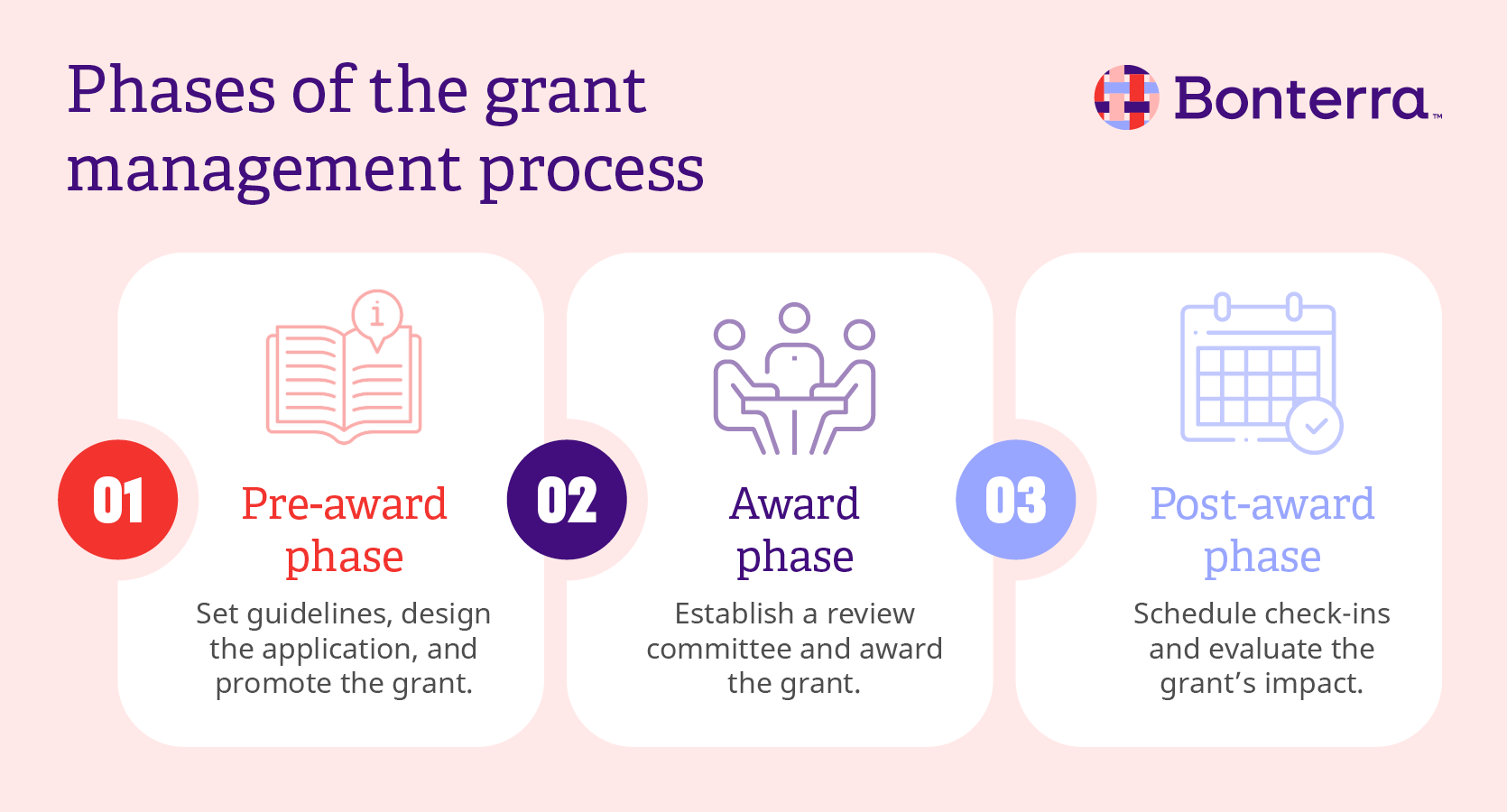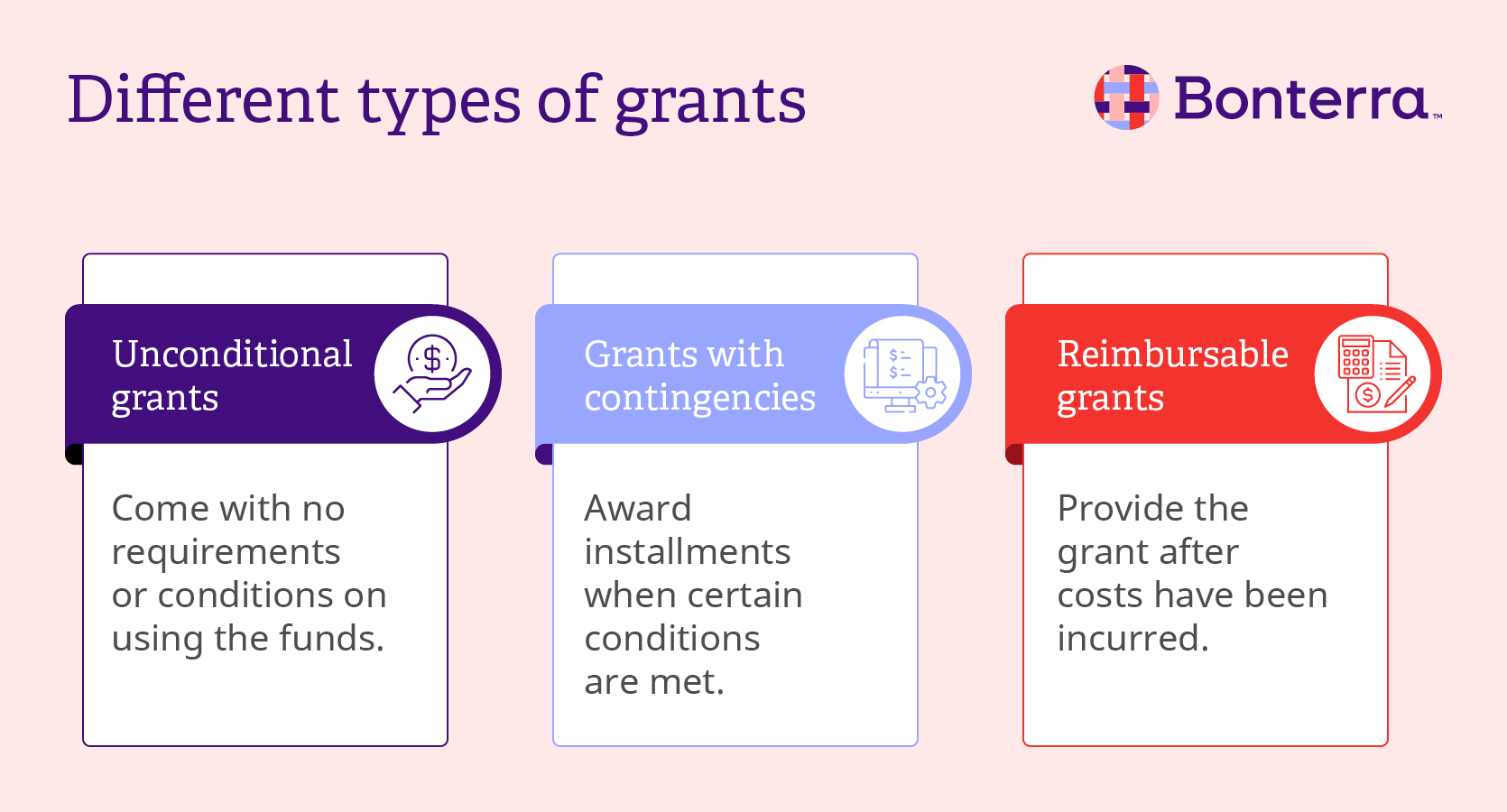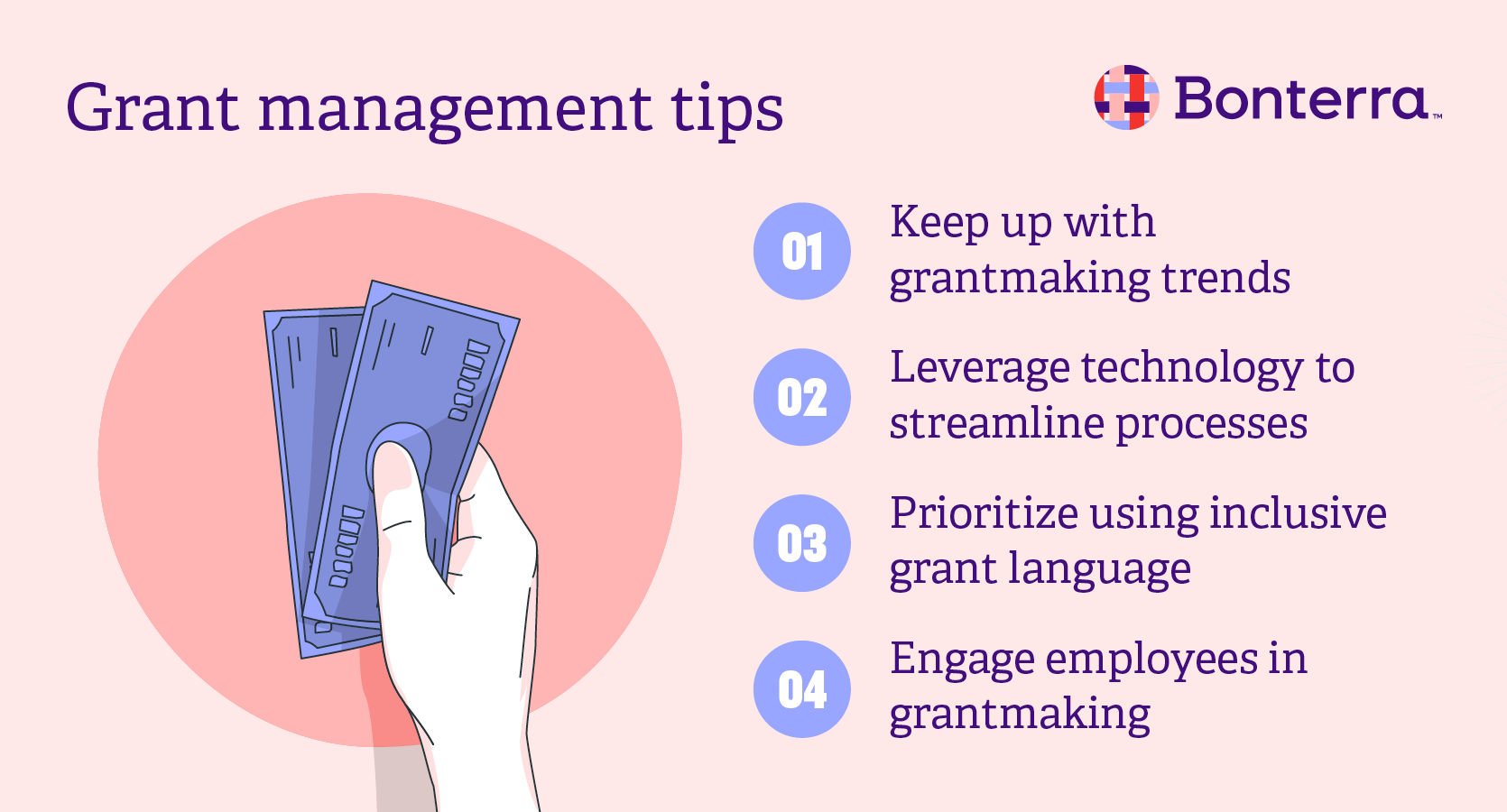Mastering the art of grant management: A complete guide

For modern corporations, philanthropy has become an expectation among customers, employees, and investors alike. Success is no longer just about making profits — but about how you transform those profits into lasting social impact. One way for your company to build meaningful partnerships with nonprofit organizations in your community is to award corporate grants.
By investing in corporate grant management software and developing a streamlined process for approving applications, your company can deliver greater impact, faster. Explore this guide to gain a better understanding of the entire grant management process and learn tips to navigate it. Let’s dive into the basics and our top grant management best practices.
What is corporate grants management?
Corporate grants are funds that companies like yours award to nonprofits to support specific projects or initiatives that align with your corporate social responsibility (CSR) goals. Corporate grants management refers to the process of setting grant guidelines, reviewing applications, and monitoring the grant’s usage once it has been issued to a nonprofit.
With a well-thought-out grant management process, your company can expedite the time between creating grants and awarding them to nonprofits that need them most. Before long, you’ll be able to tap into more benefits of strategic philanthropy, including:
- Enhanced brand reputation. A strong grantmaking program demonstrates your company’s commitment to social good and bettering its community.
- Increased talent acquisition. By providing essential funds to nonprofits, your company can attract more socially conscious employees, such as many millennial job seekers.
- Improved employee engagement. Your employees are more likely to stay invested in their roles when they know that your company’s success feeds directly into making a difference in the world.
70% of people believe that companies have a responsibility to make the world a better place. Because of this, it’s more important than ever for your company to develop an effective grant management process.
How is grant management different for grantmakers and grant seekers?
Grantmakers refer to companies, private foundations, and other organizations that award grants to nonprofits. These nonprofits are grant seekers, meaning that they seek out, apply for, and use grants to fund their work.
Grant management can refer to the following processes for each group:
- For grantmakers, grant management involves creating guidelines for the grant’s usage, awarding grants to eligible nonprofits, and monitoring the grant recipient’s progress.
- For grant seekers, grant management involves tracking awarded funds, reporting on how funds are spent, and communicating with the grantmaking organization.
While grantmakers use tools like corporate responsibility software to manage grants, nonprofit grant seekers often leverage their constituent relationship management (CRM) solutions for grant tracking. In this article, we’ll focus on the management process for corporate grantmakers.
The grant management process
For grantmakers, the management process encompasses everything from planning your grant to evaluating its impact after you’ve allocated all of the funds.
The corporate grants management process involves three main phases:

Pre-award phase
Before you can start giving out grants, you first need to establish your goals and guidelines. In the pre-award phase, you’ll plan your company’s approach to grant management, identify focus areas, and request grant applications from nonprofits.
Follow these steps during the pre-award phase to set your company up for success:
- Determine the grant’s objectives. To reinforce your brand identity and present a consistent picture of your philanthropic goals to your stakeholders, you should support organizations that share similar values and areas of focus with your company. For example, a technology company might offer a grant to fund cybersecurity training and resources for a nonprofit.
- Develop specific grant guidelines. Put together clear guidelines for grant seekers to reference, including details such as application deadlines, eligibility requirements, and required documents to submit. In addition to a grant proposal, for instance, you might ask that nonprofits share letters of endorsement from community partners or leaders.
- Design a grant application form. Build your grant application form by identifying the specific details you’ll need nonprofits to provide, such as their tax identification number and purpose statement. As you create your form, take accessibility into account by making it mobile-responsive and using plain, clear language.
- Promote the grant on multiple platforms. Get your grant in front of nonprofits by spreading the word on multiple platforms. Feature it on your website, post about it on social media, and share it with your email list.
Taking the time to specify your grant’s objectives and guidelines ensures that you keep everyone on the same page while promoting the grant and reviewing applications.
Award phase
To prepare for evaluating grant applications, establish a review committee of internal and external stakeholders, such as leadership members, employees across various departments, and community representatives. Before these individuals start assessing each proposal, do an initial screening to ensure that they meet the basic eligibility requirements you’ve established.
Your review committee should then establish evaluation criteria and a scoring system to guide their decision-making. After discussing proposals collaboratively, the committee should come to a consensus on which nonprofit(s) should receive your corporate grant. From there, you’ll notify the nonprofit and send clear instructions on how they can receive and use the funding. For example, specify which projects they can use the grant for, reporting requirements, and the exact amount of funding they’ll secure.
Post-award phase
Once you’ve awarded the grant to a nonprofit, maintain open communication with the organization to monitor the impact they’re making with your grant. You can stay updated on how they’re using the funds by:
- Scheduling check-in meetings or site visits.
- Collecting data on key performance indicators (KPIs).
- Reviewing the nonprofit’s financial reports and expenses.
- Gathering feedback from stakeholders such as the nonprofit’s staff and beneficiaries.
In the next section, we’ll dive deeper into what successful grant management looks like and what you can do to simplify the process.
5 steps for effective corporate grants management
Set your company’s grantmaking program up for success by following these essential grant management steps:
1. Determine your grant goals.
First, identify your company’s specific philanthropic priorities and how your grant will contribute toward them. The purpose of the grant and the organizations you’re planning to support should align with your overall values and purpose. For example, a healthcare company might create a grant that will fund projects to expand community health services within its community.
Once you have a clearer idea of what you’re hoping to accomplish with your grant, determine what internal resources you’ll need to manage the grant effectively. This could include adopting grant management software, such as Bonterra CyberGrants, with features that streamline:
- Application eligibility verification.
- Budget tracking.
- Grant approval.
- Funds disbursements.
- Impact reporting and data visualization.
Evaluate both your technical resources and team member availability to determine if you need to make any changes before moving forward. Make sure you have the tools necessary to simplify your grant management; Submittable or alternatives, like Bonterra, are popular choices.
Not sure how to leverage grants management software for your company? Explore how Sanofi uses Bonterra Grants Management to expedite its processes.
Next, take the time to iron out the specifics of your grant. There are three main types of grants your company can offer:

Unconditional grants
Unconditional grants provide “unrestricted funding” to nonprofit recipients. This means that there are no requirements or conditions that stipulate how the organization uses the funds. Consequently, nonprofits have the freedom and flexibility to allocate these corporate grants according to their priorities. However, they should still keep you updated on how they’re putting your contribution to good use.
Grants with contingencies
For a nonprofit to receive a grant with contingencies, it usually has to fulfill certain conditions set by your company. You’ll generally award this money in installments over time as the nonprofit meets your requirements. For example, you might set project milestones that the organization has to meet, such as reaching a certain number of beneficiaries by a certain date, to continue accessing the grant funds.
Reimbursable grants
Companies only award reimbursable grants to nonprofits after they’ve incurred the costs for the program that the grant will cover. For instance, if you’re providing a grant that will fund a nonprofit’s new educational program, the organization will need to pay for the program first. Then, you’ll present the grant to reimburse the nonprofit for its expenses.
2. Develop your grant application form.
Before you start accepting grant proposals, outline the specific guidelines of your grant. For instance, you’ll want to set:
- The amount of grant funds available.
- Application deadlines.
- Types of organizations that are eligible to apply.
- Any geographic restrictions.
- Required documents to submit.
After you’ve finalized these details, put together a grant application form that interested nonprofits will fill out. Include fields for collecting information such as the organization’s contact details, purpose statement, and grant goals. Infuse accessibility and diversity, equity, and inclusion (DEI) best practices into your form by making it mobile-responsive, ensuring that it’s keyboard-navigable, and allowing applicants to self-describe their demographic information.
3. Promote your corporate grant opportunity.
When your application form is ready, it’s time to start making nonprofits aware of your corporate grant opportunity. Promote your grant on multiple platforms including:
Your website. Consider creating a dedicated section on your company’s website that features up-to-date information about your corporate grants. Additionally, you can provide application tips, FAQs, and other resources for interested nonprofits.
Social media. Produce eye-catching social media posts that highlight your grant opportunity. You can engage potential applicants even further by hosting live Q&A sessions that give them the chance to ask specific questions related to the application and grant guidelines.
Email. Segment your company’s email list to send targeted emails to nonprofits who are eligible for your corporate grant. Be sure to include clear calls to action within your email to encourage readers to navigate to your website to learn more.
Regardless of the channels you use, make it easy for nonprofits to understand your grant’s focus and eligibility criteria so they can quickly determine whether or not they’d like to apply. This will save their team time and ensure that you don’t receive applications from nonprofits that don’t meet your requirements.
4. Create a review committee and assess applications.
Next, put together a review committee and establish criteria to evaluate grant proposals that come in. To set up a fair and transparent grantmaking process, keep these tips in mind:
- Recruit a variety of key stakeholders, including executive leaders, employees, community representatives, relevant subject matter experts, and other external advisors.
- Ensure that your committee is composed of people with diverse backgrounds and perspectives to promote well-rounded decision-making.
- Provide committee members with training, familiarizing them with background information related to your grant’s purpose and guidelines.
- Establish a scoring rubric and highlight other key factors to consider when assessing applications.
- Organize review meetings that allow committee members to collaboratively evaluate grant proposals.
Once your committee has selected a nonprofit to receive the grant, notify the applicant by making a phone call or scheduling a meeting. From there, you’ll sign an agreement to make sure both parties are aligned on how the funding will be used, reporting expectations, and relevant timelines.
5. Monitor and evaluate the grant’s impact.
Throughout the grant management process, stay in touch with the nonprofit to keep an eye on their spending and performance. Assess your grant’s impact by establishing KPIs such as:
- Program reach.
- Number of services provided.
- Resource utilization.
- Stakeholder satisfaction.
While your grant management solution streamlines the process of measuring impact, schedule regular check-ins and site visits to get a more comprehensive view of the grant’s effect on your nonprofit recipient and the wider community.
Bonus grant management tips
Ready to start amplifying your company’s social impact through corporate grants? Use these expert tips to make your grant management process as efficient as possible:

- Stay up to date with the latest grantmaking trends to better meet shifting nonprofit and community expectations.
- Leverage technology to streamline grant management tasks like tracking submissions and managing grant-related documents.
- Prioritize using inclusive grant language that makes your grant opportunities accessible to nonprofit leaders of all backgrounds and experience levels.
- Engage more employees in your grantmaking process by allowing them to vote on which nonprofits or areas of focus they’d like to support through grants.
Continually assess your grantmaking history and impact to identify additional ways to hone your approach to grant management. By maintaining an improvement mindset, you can set your company up to make a more meaningful difference in the community over time.
Want to jump right into improving your grant management process? Download our free guide to get started with six top strategies.
How to manage grants with Bonterra Grants Management
Managing grants doesn’t have to be a complex process, especially when you have the right technology to power your organization. Streamline your corporate grants management efforts with Bonterra’s grant management solutions. Our powerful solution empowers you to automate application approvals, track your grant budget, and measure your impact all in one place.
Explore the best software for streamlining your grant management process.
Work with Bonterra



